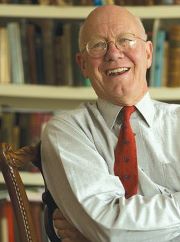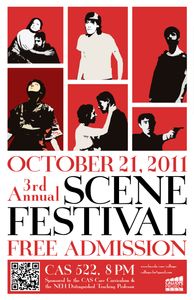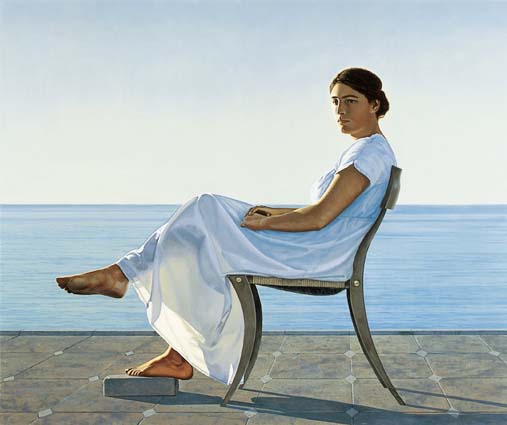October 21, 2011 at 10:57 am
- Arrange to have garlic and onions cast into hot oil.
- The carrot and celery you must divide against themselves. Ground beef, too, shall turn upon the burner; crush any coherent resistance with a spoon of wood. Sautee until no hint of blood remains to stain your hands.
- Perhaps, in a dark place without witnesses, the tomato shall meet with the knife.
- The basil and parsley you may use without consequence. For long minutes, all shall be muddled and roil on the surface of the flame.
- If it is most advantageous, store cold for the proper day.
by Brendan Adkins, from his Ommatidia blog
By CAS Core Curriculum
|
Posted in Great Ideas
|
Tagged food, humor, Machiavelli
|
October 19, 2011 at 5:31 pm
 Students and alumni are invited to join a lunchtime discussion tomorrow afternoon (Thursday, October 20th), from 11:30-12:30PM in the School of Theology basement, room B-24. Professor Christopher Ricks of the BU Editorial Institute will be talking about John Donne and Bob Dylan.
Students and alumni are invited to join a lunchtime discussion tomorrow afternoon (Thursday, October 20th), from 11:30-12:30PM in the School of Theology basement, room B-24. Professor Christopher Ricks of the BU Editorial Institute will be talking about John Donne and Bob Dylan.
Professor Ricks has written extensively about English poetry, and in 2005 published a book on Dylan's vision of sin. His works can be perused at Amazon.com.
There is no charge to attend and join the discussion, or for the lunch. All members of the campus community are welcome to attend, as are their guests.
By CAS Core Curriculum
|
Posted in Activities, Events
|
Tagged discussion, event, lunch, Ricks, talk
|
October 19, 2011 at 4:00 pm
Beyond the sheer mental workload, our thoughts have acquired a new orientation. Of the two mental worlds everyone inhabits, the inner and the outer, the latter increasingly rules. The more connected we are, the more we depend on the world outside ourselves to tell us how to think and live. There's always been a conflict between the exterior, social self and the interior, private one. The struggle to reconcile them is central to the human experience, one of the great themes of philosophy, literature, and art. In our lifetime, the balance has tilted decisively in one direction. We hear the voices of others, and are directed by those voices, rather than our own. We don't turn inward as often or as easily as we used to.
In one sense, the digital sphere is all about differentiating oneself from others. Anyone with a computer can have a blog now, and the possibilities for self-expression are endless. However, this expression takes place entirely within the digital crowd, which frames and defines it. This makes us more reactive, our thinking contingent on others. To be hooked up to the crowd all day is a very particular way to go through life.
-- William Powers, Hamlet's Blackberry, New York: HarperCollins, 2010 (p. 2-3)
By CAS Core Curriculum
|
Posted in Other Publications
|
Tagged criticism, digital, excerpt, internet, quote
|
October 19, 2011 at 11:58 am

Come and enjoy various scenes from famous plays and works of literature performed and directed by the Core student and Core alumni members of Calliope Project theater troupe. The pieces at this Friday''s show are drawn from sources including Hamlet, Eurydice, Rosencrantz and Guildenstern Are Dead, The Night Thoreau Spent in Jail, and the poetry of Walt Whitman.
The festival will take place in CAS 522 this Friday, October 21, at 8PM. Tickets are free to all members of the BU community and their guests.
More information at http://www.facebook.com/#!/event.php?eid=174976159255067.
By CAS Core Curriculum
|
Posted in Events
|
Tagged alumni, calliope, event, free, theater
|
October 12, 2011 at 10:21 am

- “Isn't it amazing that the first major work of western civilization -- Gilgamesh -- depicts the destruction of a human city?”
- “Menelaus is about to kill Helen, but (smart lady), she bares her breast to him, and he throws his sword down. Some things never change.”
- “Calypso's name means concealment and while Odysseus is with her he is concealed for seven years from everything but forced sex, for Homer makes it clear that Odysseus must sleep with this divine being.”
- “A house is made of wood and beams. A home is made of love and dreams.”
- “Look at this picture [pictured above]. What do you see? I see Penelope. I see that within her hands, within her gaze, she holds not only the fate of Ithaca, but also the fate of Odysseus and The Odyssey as a whole.”
- “How did 28,000 lines of poetry survive for the period of 500 years before Homer wrote them? We will never know; nor could we ever understand, because we don't live in an oral society.”
As recorded by Core office employee Winona Hudak during Prof. Stephen Esposito's discussion of Homer's Odyssey during this week's CC101 lecture.
By CAS Core Curriculum
|
Posted in Core Lecturers
|
Tagged CC101, Esposito, Homer, odyssey, six quotes
|
October 12, 2011 at 10:14 am
The sweetest and most inoffensive path of life leads through the avenues of science and learning; and whoever can either remove any obstruction in this way, or open up any new prospect, ought, so far, to be esteemed a benefactor to mankind.
- David Hume, An Enquiry Concerning Human Understanding
By CAS Core Curriculum
|
Posted in Analects
|
Tagged analect, CC203, Hume, Science
|
October 12, 2011 at 8:57 am
The "Arab Shakespeare Trilogy": Staging a Region in Tumult, 2002-2011
What: Lunch and public conversation with video examples from Sulayman Al-Bassam's "Arab Shakespeare Trilogy"
Who: Anglo-Kuwaiti theater director Al-Bassam, MLCL Arabic literature professor Margaret Litvin, and interested students and faculty
When: Wednesday Oct 12, 12-2pm. Buffet lunch will be served before and during the talk.
Where: The Castle, 225 Bay State Road
Sulayman Al-Bassam, a fabulous Anglo-Kuwaiti playwright/director on whose work Prof. Litvin has written a fair amount, will be in Boston staging his show The Speaker's Progress, based on Shakespeare's Twelfth Night, at ArtsEmerson. Prof. Litvin is moderating a post-show talkback there on October 13, but he's also agreed to squeeze in a lunchtime event at BU on the day of the show's opening -- today!
The BU event will be an informal lunch for interested faculty and students, followed by a "public conversation with dramatic examples" -- video clips from all three plays in his "Arab Shakespeare Trilogy." (The other two were the award-winning Al-Hamlet Summit, of which the script has been published bilingually, and the RSC-commissioned Richard III: An Arab Tragedy.) The conversation will be in English. This will be the first in an occasional series of events in different formats bringing rehearsed readings and discussions of Arabic plays to BU.
Prof. Litvin will begin with the following questions for Al-Bassam, and she encourages students to come to the event with their own questions in mind:
* What is it like to make theatre in the Arab world? during and about the "Arab spring"?
* Why and how does Al-Bassam work with Shakespeare?
* What is censorship like in different Arab (and western) contexts?
* How does one handle the challenges of intercultural theatre?
* Why, in the first place, produce plays on Arab topics for mainly English-speaking audiences? Why do it in Arabic?
For more information, visit http://www.bu.edu/mlcl/2011/10/06/margaret-litvin-to-host-talk-with-sulayman-al-bassam-the-%E2%80%9Carab-shakespeare-trilogy%E2%80%9D-staging-a-region-in-tumult-2002-2011/.
By CAS Core Curriculum
|
Posted in Announcements, Events
|
Tagged Arabic, Litvin, theater
|
October 10, 2011 at 10:32 am
Lectures this week
- CC101: Stephen Esposito on Homer's Odyssey (10/11)
- CC105, Tuesday: James Jackson on Wave-particle Duality (10/11)
- CC105, Thursday: James Jackson on Probability (10/13)
- CC201: Walter Hopp on Descartes (10/11)
- CC203: Charles Lindholm on Rousseau and Hume (10/13)
General announcements
- A reminder to alumni -- if you will be in Boston during a scheduled course lecture, and have a desire to sit in, let us know. It is often the case that you'll be able to join the audience as a guest.
- The Core Writing Center is now open; tutors will be available for half-hour appointments Monday through Friday, 10-1 and 2-4. Students may visit the Core office, CAS 119, to sign up for a session, or email us to request an appointment.
Next week, CC105 at the planetarium
A reminder that all students in the first-semester Core Natural Sciences must attend one of the three scheduled planetarium sessions at the Museum of Science from 6-7:30 on Monday 10/17, Tuesday 10/18, or Thursday 10/20. Please contact your CC105 discussion leader if you have any questions.
Lunch & Talk with Kuwaiti Shakespeare Director
MLCL Arabic literature professor (and former Core discussion leader) Margaret Litvin will sit down today for a talk with Anglo-Kuwaiti theater director Al-Bassam, whose show The Speaker's Progress -- based on Shakespeare's Twelfth Night -- opens this evening at ArtsEmerson. Students are invited to join the discussion, and to stay for lunch, at The Castle, 225 Bay State Road, from 12-2 PM.
Upcoming events in the Core
- Thursday, 10/13: A seminar with Richard Tuck. An opportunity for CC203 students to discussion, in an informal setting, the Leviathan of Hobbes with this esteemed Harvard scholar. 5-6:30 in the Core office, CAS 119.
- Sunday, 10/16: Core in the City trip to the Museum of Science Omni Theater, to see "Greece: Secrets of the Past." Core has 15 tickets for the 1 PM showing; please sign-up in the Core office. More information at Link is http://www.mos.org/exhibits_shows/imax&d=731.
- Thursday, 10/20: A "Lunch Box Talk" with Christopher Ricks. All students are welcome to drop in to this first session of a free lunch & discussion series, to hear Prof. Ricks speak about John Donne and Bob Dylan, and to join the conversation afterward. 11:30-12:30, in the School of Theology basement.
- Thursday, 10/20: Third meeting for the Core Journal staff, 5-6 pm in the Core office, CAS 119. On the agenda: interview and feature brainstorming, cover art, and assignments for soliciting submissions. Please direct questions to editor Megan Ilnitzki, milnit@bu.edu.
A quote from Core lecture
From Tuesday's talk by Prof. Esposito on Homer's Odyssey for the students of CC101: "Menelaus is about to kill Helen, but (smart lady), she bares her breast to him, and he throws his sword down. Some things never change."
Students may RSVP for events by emailing core@bu.edu, by adding their name to the sign-up sheet in CAS 119, or by visiting the RSVP link provided. If you have any suggestions for or comments about Core activities, please contact Zachary Bos at core@bu.edu. Get connected with Core: The Core blog | Facebook | Calendar
By CAS Core Curriculum
|
Posted in e-bulletin
|
Tagged e-bulletin
|
October 7, 2011 at 11:23 am
When any one, or more, shall take upon them to make laws, whom the people have not appointed to do so, they make laws without authority, which the people are not therefore bound to obey... [and] may constitute to themselves a new legislative, being in full liberty to resist the force of those, who without authority would impose any thing upon them.
- John Locke, Second Treatise of Government (Ch.XIX, Paragraph 212, pg. 108)
Read about how Occupy Boston affirms basic liberties.
By CAS Core Curriculum
|
Posted in Analects
|
Tagged analect, CC203, Locke, politics
|
October 5, 2011 at 4:16 pm
"Reason and heart will give you words, Telemakhos;
and a spirit will counsel others. I should say
the gods were never indifferent to your life."
- Homer, from The Odyssey Book III, lines 31-33. Translation by Robert Fitzgerald.
By CAS Core Curriculum
|
Posted in Academics, Analects, Uncategorized
|
Tagged Analects, CC101, Homer, odyssey
|



